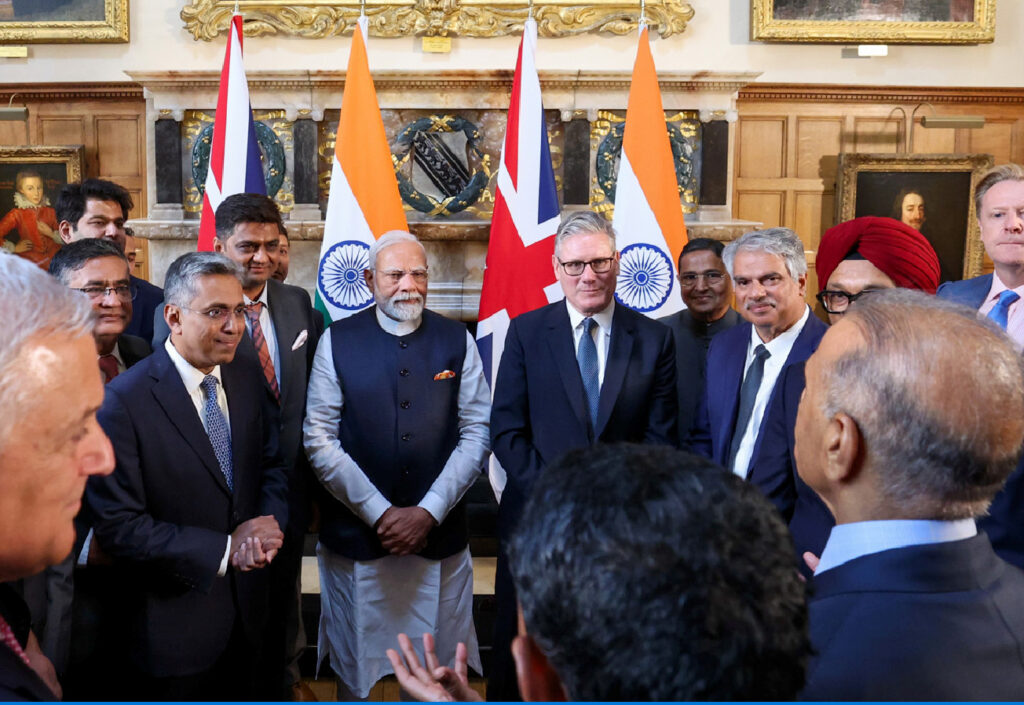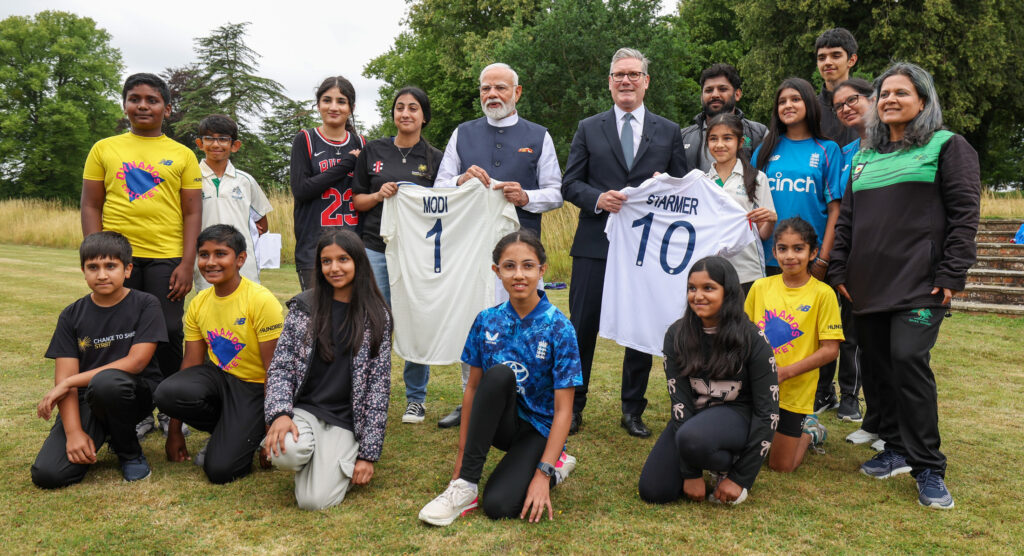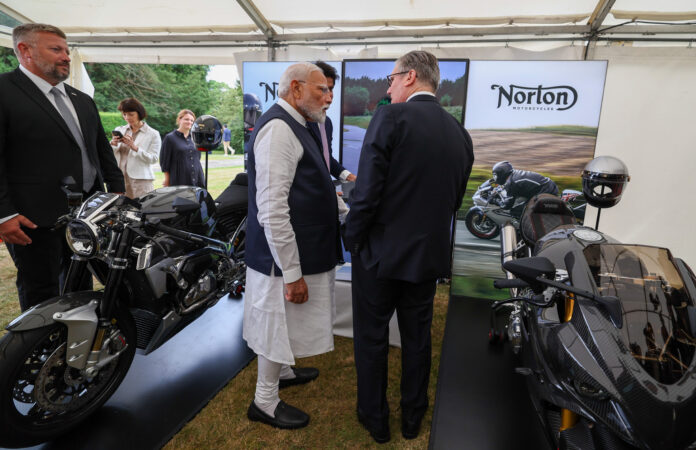Tipplers are saying cheers to UK-India FTA and profusely thanking Modi and Starmer for making Scotch affordable in a country with largest voluntary tax [excise tax] paying population. Prayers have been heard.
But India UK deal is much more than Starmer-Modi clinking a deal on Scotch that brings a twinkle in the eye of the tippler at the bar. The pact also packs a load of promises for farmers, fisherman, women, youth, professionals, entrepreneurs, and MSMEs.
In a historic milestone, Prime Minister Narendra Modi and his UK counterpart Keir Starmer inked the India-UK Free Trade Agreement (FTA) on July 24, 2025, calling it a “People’s Deal” set to reshape economies of two nations. This Comprehensive Economic and Trade Agreement (CETA) aims to enhance bilateral trade, create jobs, and foster inclusive growth.
As the agreement nears implementation, take a look at what it brings to the table for India’s biggest market bustling with middle class with ready cash and jobless youth:
Farmers Gain Access to UK Markets
Indian farmers are set to benefit significantly with zero-duty access to the UK’s $37.5 billion agricultural market. Crops like millets, jackfruit, and organic herbs will tap into new international demand. Sensitive sectors such as dairy and apples remain protected from tariff cuts. Traditional farming knowledge gets patent protection, safeguarding India’s agricultural heritage. Experts project a 20% rise in agricultural exports over the next three years, with rural states like Tamil Nadu and Punjab poised to lead. UK media notes that this deal could transform Indian agriculture by linking it to premium UK markets. However, the Indian farmers must adapt to global standards for this to succeed.

Fisheries Look To Haul A $5.4bn Market
The FTA opens the UK’s $5.4 billion marine products market to Indian fisherfolk with zero-duty access for Shrimp, Tuna, and fishmeal. This will uplift the lives of 28 million households, eaking a living on the coasts of Andhra Pradesh, Odisha, Kerala, Gujarat, and Tamil Nadu. Indian exporters will gain parity with European giants like Germany, boosting the seafood sector. This agreement positions Indian fisherfolk as key players in the UK market, enhancing bilateral trade diversity.
Women Empowered Through Inclusive Trade
Marking a historic first, the FTA includes gender-inclusive provisions. Women artisans, micro, small, and medium enterprises (MSMEs), and self-help groups (SHGs) will gain duty-free access to the UK’s $23 billion market, with intellectual property (IP) protection for innovations in biotech, textiles, and beauty. Training, finance, and skilling programmes are set to drive this growth, with leather and textile exports from hubs like Kanpur and Tirupur projected to exceed $900 million. This brings a gender equity in trade and empower Indian women entrepreneurs. How much of it will be implemented on the ground, remains to be seen.
Giant Leap of MSMEs Onto Global Stage
MSMEs are central to the agreement. They gain trade finance, IP rights, and global recognition. Leather and footwear exports to the UK could surpass $900 million, benefiting manufacturing hubs across India. Simplified customs and equal treatment clauses enable MSMEs to bid for UK government contracts. Integrating MSMEs into global value chains is the high point. On another note, UK businesses may face stiffer competition, lest they see an opportunity for collaboration in it.
Youth and Professionals Unlock Global Pathways
Young professionals, including chefs, yoga instructors, and artists, will benefit from enhanced UK mobility. As many as 75,000 Indians will be exempt from social security dues. The agreement promises higher job opportunities and real wage growth in IT, finance, education, and textiles. This mobility clause could attract talented Indians, enriching the UK workforce.
Businesses Enjoy Smoother Trade Routes|
Indian businesses will benefit from simplified customs, equal treatment, and procurement access. The MSMEs can now compete for UK government contracts, with the services sector gaining visa clarity. The deal aims to elevate bilateral trade to $120 billion by 2030, say the trade analysts. This could streamline UK-India trade, though regulatory alignment remains a challenge.

Geopolitical and Economic Impact
The FTA strengthens strategic ties, with tariffs on British products like cars and cosmetics dropping from 15% to 3%, benefiting Indian consumers, The UK taps into India’s consumer market. This deal secures UK’s post-Brexit position in the Indo-Pacific.
Upsides and Downsides for UK and India|
Downsides first.
For UK, there will be competitive pressure. Zero-duty access for 99% of Indian exports could challenge UK manufacturers. Regulatory adjustments will not be easy. Aligning with Indian norms may require costly changes for UK businesses. There is also a risk of trade deficit. Increased Indian imports might widen the UK’s trade deficit.
For India, market may become vulnerable by reduced tariffs which could may expose local industries to cheaper UK imports if protections falter. Implementation challenges are as big as India itself, as without ensuring uniform implementation the benefits could be uneven. Over-reliance on the UK market might also limit diversification.
Now the Upsides.
For the UK, entry into India’s growing consumer market offers significant trade potential. The £25.5 billion trade increase will benefit sectors like automotive and services. The FTA also becomes a powerful force multiplier in UK’s post-Brexit strategy as a strengthened Indo-Pacific ties enhance the UK’s global trade network.
For India, FTA means economic growth. Trade could reach $120 billion by 2030, creating jobs and boosting exports in agriculture, textiles, and services. FTA also promises inclusive development for farmers, fisherfolk, women, MSMEs, and youth through broad economic participation. Enhanced UK ties also elevate India’s global standing and geopolitical influence.



